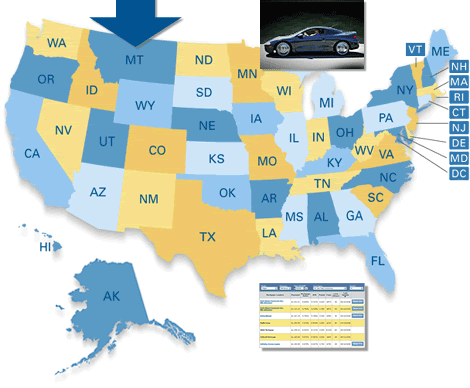Driving a hard bargain on car insurance
by Broderick Perkins
(9/13/2010) State Farm wasn't there and, with Allstate, well, maybe you aren't in the best of hands, according to consumers asked to rate auto insurance companies.

Consumer Reports found NJM Insurance Group (94), USAA Group (93), Amica
Mutual Group (93) and Auto-Owners Insurance (92) at the top of the heap
after it surveyed 28,241 auto policy holders who had filed auto insurance
claims -- settled or rejected -- from January 2006 to June of 2009.
A score of 100 meant readers were completely satisfied; 80, very satisfied,
on average; 60, fairly well satisfied.
The doesn't mean State Farm (89) and Allstate (85) were rated poorly. They
just didn't get the highest marks.
Most auto insurers are doing a good job and settling claims.
The survey of Consumer Reports readers found that 86 percent of readers who
filed claims were highly satisfied with how insurers handled their claim.
Even those at the bottom of the heap, Commerce Insurance (81), MetLife Auto
& Home Group, Travelers and Progressive Group of Insurance Companies (all
84) and Farmers Insurance Group of Companies (84) were all found to be
better than satisfying, according to the survey.
Complete results are in the October 2010 issue of Consumer Reports magazine
and online for subscribers.
So how do you stay satisfied?
Consumer Reports advises:
• Check rates annually. Check rates from a variety of insurers
each year to compare. More than 60 percent of those surveyed have been with
the same carrier for 10 or more years and, as a result, couldn't find a
better rate.
• Drive less. Miles driven per year is a major component
considered for your premium. Lower mileage translates into lower premiums.
Saves gas costs too. Let your insurer know if you've retired, changed jobs
or otherwise reduced driving for a 5 to 10 percent reduction in your
premiums.
• Drive the right car. Before buying a car, ask your car dealer to show you the "Relative
Collision Insurance Cost Information Booklet," produced annually by (and
available online from) the National Highway Traffic Safety Administration (NHTSA).
The Highway Loss Data Institute, likewise, offers data on
types of losses by vehicle model. Also, ask your insurer for
quotes on different models.
• Up the deductible. Raise your deductible to as much as you can
afford out of pocket to reduce your premium. Upping your deductible from
$200 to $500 can cut your premium on collision by 15 to 30 percent. At
$1,000 you could slash your premium by 40 percent.
• Parent your teen. Protect your child and cut your rates, by
making him or her take a driving course before getting a license. Teens are
less experienced and have a higher crash rate than adults. Also let your
insurer know when your child is away at college or otherwise not driving the
car.
The Insurance Information Institute offers still more
money-saving ideas for car insurance.
• Drop coverage on older
cars. If your car is worth less than 10 times the premium,
purchasing the coverage may not be cost effective. Instead of paying
premiums, save the money for car repairs, Auto dealers and banks can tell
you the worth of cars. Or you can look it up online at Kelley's Blue Book.
• Use one insurer. Most auto insurers will give you a break if you buy two or
more types of insurance or insure more than one vehicle. That doesn't mean
not to shop around for the best break.
• Maintain good credit. Most insurers use credit information to
price auto insurance policies. People who effectively manage their credit
have fewer claims. Pay your bills on time, don't obtain more credit than you
need, keep your credit balances as low as possible and, only with the
truly-free AnnualCreditReport.com, check your
credit regularly to address errors and other problems.
• Consider group insurance. Buying in bulk, a group plan, say
through your employer, business or alumni association, union or other large
group, can come with reduced auto insurance premiums.
Other Articles:
Chances are,
your next car will be used. Drive a hard bargain
Cost of Owning
a Car on the Rise, Find Low Rate Auto Loan Online
Auto Loans Advice: New Cars & Used Cars
Life Insurance Overview
Tips on Buying Long-Term Care Insurance
New and Used Auto Loan Rates
Choose Your State Below

Start by selecting your state

Life Insurance
- Term, Whole, Universal, Varialble Life Insurance
- Guidelines for Purchasing Life Insurance
- Life Insurance: Finding the Best Rates
- Life Insurance Explained: Types and Coverage

Medical Insurance
- Health Insurance Basics
- Healthcare Costs and Retirement
- Critical Flaws in HealthCare
- Disability Insurance
- Tips on Buying Long Term Care Insurance
General Insurance Articles

Homeowners Insurance
- Homeowners Insurance Premiums Policy
- Homeowners Insurance: Filing a Claim
- Punxsutawney Phil's forecast-homeowners insurance rates
- Homeowners Insurance Costly Trends
- Home Insurance Costs on the Rise, Coverage Options Decrease
- Homeowners Insurance: The Special Policy for Condo Owners
- Homeowners Insurance College Students Coverage
- Underinsured Homeowners
- Beyond Homeowners Insurance: Coverage for Renters
- What Home Owners Insurance Do You Need? Tips for the Best
- Home Insurance Quotes: Types of Home Owners Insurance
- Home Insurance: How are Insurance Quotes Determined?
- Homeowners Insurance: Finding the Best Quotes


Auto Insurance

- Hitting the brakes on auto insurance costs
- Car Insurance Quotes: Discovering best deals
- Car Ins Quotes: What Factors Determine Rates
- Auto Insurance Quotes and Policies: Commonly Used Terms
- Shopping Prep: What You'll Need to Obtain Car Insurance Quotes
- Auto Insurance Terms & Descriptions
- Understanding Your Auto Insurance Quotes: The 7 Types of Car Insurance
- Auto Insurance - Best Plan for You
- How much Car Insurance to buy
- Need to Know Auto Ins Policy
- Automobile Insurance Settlement Advice
- Managing Auto Insurance: What to Do After an Accident
- Filing a Car Insurance Claim: Steps to Follow after an Accident
- Auto Insurance Steps to Filing a Claim
- Tips - Reducing your Auto Insurance Expenses
- Driving a Hard Bargain
- Slow Down Drive Safely
- Cheapest & Most Expensive Vehicles to Insure
